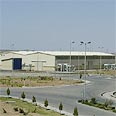
Nuclear facility in Natanz (archives)
צילום: איי אף פי
Iran envoy: Atom bomb would be strategic mistake
Islamic Republic's ambassador to IAEA suggests his country could never compete with nuclear-armed major powers in terms of number of warheads. 'We are as strong as those countries without nuclear weapons,' Ali Asghar Soltanieh says
Building nuclear bombs would be a strategic mistake for Iran, its envoy to the UN atomic agency said on Monday, and a leading Western expert said Tehran should be taken seriously when it insists it will not obtain such arms.
Ali Asghar Soltanieh, Iran's ambassador to the International Atomic Energy Agency (IAEA), suggested the Islamic Republic could never compete in terms of the numbers of warheads possessed by the nuclear-armed major powers.
It would therefore be at a disadvantage in relation to these countries if it developed atomic bombs, Soltanieh said.
"That is the reason we will never make this strategic mistake," he told a conference at IAEA headquarters in Vienna. "We are as strong as those countries without nuclear weapons."
He was speaking a few days after Iran said it was ready to resume negotiations with the six powers involved in efforts to defuse a long-running dispute over its nuclear program.
The United States and its allies suspect Iran is seeking nuclear arms capability and wants Tehran to curb its activity.
Iran says its activities are solely aimed at generating electricity so that it can export more oil and gas.
In September, an IAEA report said Iran was pushing ahead with its nuclear work in defiance of tougher sanctions introduced on the major oil exporter in recent months.
It also voiced growing frustration over what the UN nuclear watchdog sees as Tehran's failure to address concerns about possible military dimensions to its program.
Soltanieh said Iran had called on the six powers -- the United States, Germany, France, Britain, China and Russia -- to come to the negotiating table without preconditions.
'Intrusive monitoring'
Five of them are permanent members of the UN Security Council and recognized nuclear weapons states.
If Iran also decided to acquire such arms, would it ever be able to compete with them? Soltanieh asked and added: "I can tell you that 100 percent no ... therefore we would be in a disadvantageous situation."
Gareth Evans, co-chair of an international commission which last year issued a report on eliminating nuclear threats, told the same gathering he believed Iran "is to be taken seriously when it says it will not actually weaponize."
There are "a number of reasons for thinking that Iran will ... stop well short of actually making nuclear weapons that it may soon have the capability to produce," the former Australian foreign minister said in a speech.
They included the risk of an Israeli attack, zero Russian and Chinese tolerance for an Iranian bomb, even tougher international sanctions and the fact that Islam does not accept weapons of mass destruction, he said.
"This is not a factor to which Western cynics would give much credence but I have to say it is echoed very strongly in every private conversation I've ever had with Iranian officials," Evans, a veteran diplomatic trouble-shooter, said.
Any agreement on removing sanctions on Iran would need to be accompanied by it accepting intrusive monitoring and inspection arrangements, Evans said.
He suggested this could give the international community about a year in "lead time in which to respond to any evidence of real intent to move to weaponization."
- Follow Ynetnews on Facebook










